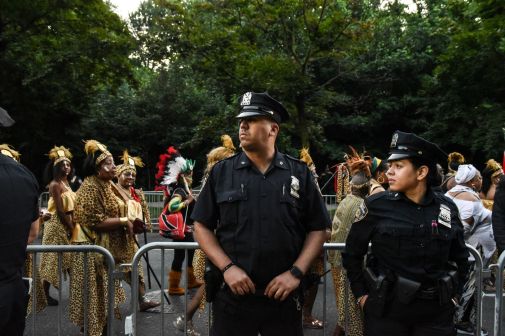Watchdogs say NYPD’s body cam policy undermines accountability, file lawsuit

Following survey data that reveals wildly varying opinions between the public and police officers, the New York City Police Department made some compromises to its body camera policy earlier this month, but many civil rights advocates are claiming that even the updated policy serves the needs of police and not the people.
When officers are compelled to turn on their cameras and how the public can gain access to the recordings are main points of contention between the NYPD and watchdog groups who say the department’s new policy does little more than give lip service to a public with a growing concern with police behavior and accountability. Though disputes like these have become increasingly common wherever police forces use body cameras, the scale of the NYPD deployment paired with the department’s stubborn and reclusive reputation are inciting interest.
Peter Zimroth, the court-appointed monitor for the force’s controversial “stop-and-frisk” policy, approved the department’s updated body camera policy, which was released April 7. NYPD is now working to equip all officers with cameras by 2019. Among the complaints leveled against the department is a letter sent to U.S. District Judge Analisa Torres in Manhattan by lawyers on Thursday who say the wording in the policy is too vague to provide the protections that the public needs.
NYPD is scheduled to deploy the first of 5,000 cameras at the end of the month.
When to press the button
NYPD officers will wear them as part of one-year court-ordered pilot project connected to a federal ruling from 2013. In that case, Floyd v. City of New York, a U.S. district judge ruled that the department had violated the Fourth Amendment and that remediation was needed.
Lawyers including Darius Charney of the Center for Constitutional Rights and Angel Harris of the NAACP Legal Defense and Educational Fund say the policy also undermines the original intent of equipping officers with cameras following the 2013 decision.
“The court ordered the body cameras to address constitutional violations by NYPD officers, not to provide an additional tool for police to investigate and charge New Yorkers,” Charney said. “The pilot policy approved by the monitor turns this purpose on its head. The importance of community input and judicial review of police practices and reforms cannot be overstated here.”
The NYPD’s body camera policy — which addresses issues of activation, notification, deactivation, retention and public access — was updated based on data collected from two surveys conducted by research institutions partnered with the department beginning last June. The Policing Project at New York University School of Law led an online questionnaire to collect public opinion and the Marron Institute of Urban Management at New York University conducted a similar online questionnaire to get the police perspective.
Each survey remained open for 40 days and the resulting data led to large adjustments, including guidance on where to place the camera on the uniform, a removal of a ban on the cameras during demonstrations, a designation of recordings by undercover officers as “prohibited recordings,” and the addition of periodic inspections and audits to ensure policy is being upheld. The standard retention period for recordings also was increased from six months to one year.
One of the biggest changes, which still remains a main sticking point for civil rights advocates, is one requiring police to record most encounters, whereas previously officers were merely “encouraged” to record.
According to the survey report, this wording was created as a compromise between the preferences of police officers and the public. More than 60 percent of officers surveyed said they believed they should “never” need to tell a member of the public they are recording, while more than 45 percent of the public said they wanted to be told “as soon as possible without compromising safety or other law enforcement interests.”
NYPD’s policy now states:
“As soon as reasonably practical, notify members of the public that an interaction is being recorded, unless notification could compromise the safety of any person or impede an investigation. … Suggested notification: ‘Sir/Ma’am, I am wearing a body-camera and this encounter is being recorded.’ … Consent is not required to start or continue recording.”
The New York Civil Liberties Union (NYCLU) criticized the policy, saying it “gives police too much control” over recordings. NYCLU credits the department for “important improvements” made since the original draft, but concludes that the final version fails on three main fronts:
- Police are not required to record all investigative encounters.
- Officers will be allowed to view recordings of incidents before they write their initial reports.
- There is no “clear and simple” way for people outside NYPD to view footage.
And while the NYCLU says the change made by the NYPD to its notification policy is a step in the right direction, Darius Charney told StateScoop via email that the wording NYPD has selected is “so vague that it makes the requirement meaningless.”
“Specifically, by requiring the notice to be given ‘as soon as reasonably practical’ without defining or giving any examples … leaves the decision about when or whether to provide notice entirely up to the discretion of the individual officer, and since we know from the … survey that overwhelming majorities of officers do not want to give notice at all, this provision of the policy creates a significant risk that officers will more often than not fail to give notice to a civilian that he or she is being recorded.”
Widely criticized
Body camera disputes like the one now underway in NYC have grown increasingly common. Ohio introduced legislation last year to create more specific rules around retention. A bill in Massachusetts introduced last year promoted the use of body cameras by all police officers in the state. A fee accompanying all body camera recording requests in Texas was criticized last year as unfairly targeting poor communities.
With at least 38 vendors providing cameras to departments across the country and large cities like New York mandating use of the technology, body-worn cameras are on the rise. But with the technology still in the early stages of adoption — about 75 percent of police reporting they do not use body-worn cameras, according to 2013 data provided by the National Institute of Justice — there’s not yet such a thing as a standard department policy.
The NYPD notes in its report that it considered the varying policies already established by departments in other cities, including Los Angeles, which “encourages” notification, and Washington, D.C., Philadelphia, and Las Vegas, which require notification. Chicago requires notification unless there are “exigent” circumstances, while Boston only permits bypassing notification if the officer’s life is in danger.
Despite the research and outreach undertaken by NYPD, many others agree that the department is not making fair compromises.
Alex Howard, deputy director of the Sunlight Foundation told StateScoop he agreed with the findings of the NYCLU.
A police body camera policy scorecard hosted by Washington-based technology policy research organization Upturn further clarifies these complaints. The website shows how city police departments like NYPD stack up against a set of eight metrics that include things like personal privacy and footage review. Aside from Parker, Colorado, no city graded against this rubric addresses all of these issues in their policies. New York City fails in five of eight categories.
A blog post on TechDirt calls the new policy “terrible” and says the department “has apparently decided to ignore” the public input they received and are instead siding with police opinion.
A blog called Simple Justice says the new policy gets body cameras “all wrong,” the main complaint centering around a requirement that those seeking the videos captured by police must file a state Freedom of Information Law (FOIL) request.
An opinion piece published by the New York Daily News by Upturn employees urges the department to “listen to what the public has to say.” Body cameras are “potent tools” that can show what happened in police shootings, the group says, but “the policies that the NYPD is putting into place risk turning these cameras from tools of accountability into something else entirely.”
NYPD did not respond to requests for comment for this story.
Data rights
Though most departments don’t publish their body camera recordings immediately, NYPD is being criticized for a policy clause that in most cases requires citizens to submit an official request to view footage.
Survey data again shows that police and the public are polarized by the issue of when the NYPD should be required to share recordings with the public. More than 70 percent of the public agree or “strongly agree” they should be allowed to view a video of their own interaction with an officer, while nearly 60 percent of police officers disagree or strongly disagree.
The NYPD reported that issues of records retention were among the most complex.
Retention periods were extended from six months to one year following the surveys, and even longer periods were established for recordings that showed use of force incidents (three years) or “adversarial police-citizen encounters” (18 months).
NYPD will tag its recordings based on these categories, each of which follow their own retention and retrieval rules.
In criminal cases, the NYPD report states it will encourage collaboration with the Civilian Complaint Review Board, so proper access to recordings can be granted. In cases where no arrest is made, a FOIL request must be made and if the recording is “not otherwise precluded by law” then it will be made available to the requester.
Criticism of this aspect of the policy is partially based on the department’s reputation of being overly opaque. Associated Press reporters Matt Apuzzo And Adam Goldman reported that, in their experience, getting the NYPD to respond to public information requests was more difficult than getting answers from the NSA, CIA or FBI.
The NYPD report tells of a centralized portal where requests can be made and provides a link, which was broken at the time this report was published.






